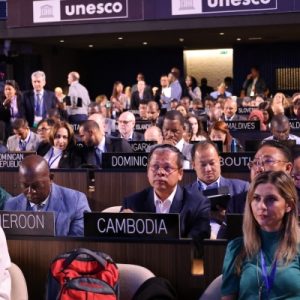Second Meeting Of The Intergovernmental Negotiating Committee (INC-2):

The United Nations Environment Programme (UNEP) has gathered in Paris, France, for the second meeting of the Intergovernmental Negotiating Committee (INC-2).
- The first session of the Intergovernmental Negotiating Committee (INC-1) concluded in Uruguay in 2022.
- INC-2 aimed to set the stage for negotiations on the substance of a global deal to end plastic pollution to edge closer to protecting ecosystems, species and humanity from the grave impacts of the linear plastics economy.
Highlights of INC-2 Meeting:
- The primary agenda of INC-2 was to adopt the rules of procedure. The rules govern various aspects such as the negotiation process, decision-making procedures (consensus or voting), and the entities authorized to make decisions.
- During the previous INC-1 meeting, a part of Rule 37, stating “each member shall have one vote,” was kept in brackets, indicating unresolved disagreement.
- The bracketed part now includes provisions from the Minamata Convention, allowing regional economic integration organizations (such as the European Union) to vote on behalf of their member states. However, the member states must be present during voting or as part of the committee.
- India has consistently insisted on bracketing Rule 38, which states, “The Committee shall make every effort to reach agreement on all matters of substance by consensus.
- If all efforts to reach consensus have been exhausted and no agreement has been reached, the decision shall, as a last resort, be taken by a two-thirds majority of the representatives of Members who are present and voting.”
- The formation of the OEWG (Open-Ended Working Group) has delayed the start of discussions in the contact groups on substantive matters.
- In UNEA resolution 5/14, the assembly mandated an ad hoc open-ended working group (OEWG) to lay the groundwork for negotiations.
INC :
- It was established in February 2022, at the 5th session of the United Nations Environment Assembly (UNEA-5.2).
- A historic resolution (5/14) was adopted to develop an international legally binding instrument on plastic pollution, including in the marine environment with the ambition to complete the negotiations by the end of 2024.




